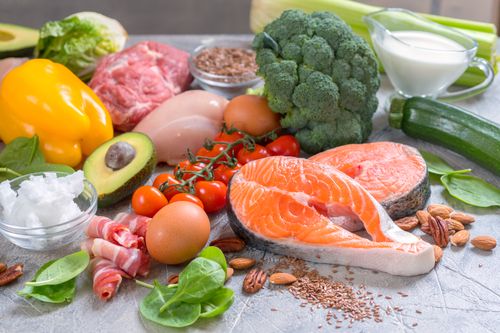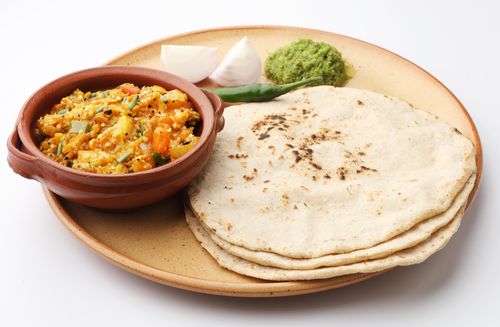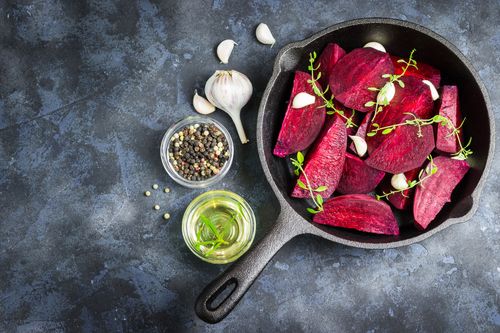20 Low-Carb Foods to Please Your Taste Buds
While you savor that chilled glass of milkshake or latte, do you think that the flavored latte contains more than 50g of carbohydrates? Or how happy do your taste buds feel while you are munching on french fries without knowing that each serving contains a whopping 54g of carbs? As per dietary guidelines by Mayo Clinic, 20-57g of carbohydrates should be the ideal daily limit in a low-carb diet. So, by consuming the above food items, you are depriving your body of the major benefits of other enriching low-carb foods.
What Are Carbohydrates?
Carbohydrates, also known as carbs, are vital macronutrients found in many foods and drinks. Your body converts the carbs into glucose, which provides you with the fuel to function. As carbs are the primary source of energy, healthcare experts strongly recommend their regulated and limited daily intake.
A diet replete with carbs is not your health’s best friend. An ideal diet comprises a blend of carbs, protein, minerals, vitamins, and fibers. Including low-carb foods in your diet means you enjoy the benefits of carbs and also prevent several risks caused due to them.
A few such health problems can be:
- Weight gain or obesity
- Elevated blood sugar level
- Addiction to sugar
- Fatty liver disease
- Poor metabolic health
- Escalated risk of heart diseases
A study done by the Harvard T.H. Chan School of Public Health shows that people with a moderate intake of carbs have lower mortality rates than those indulging in high carb meals.
20 Healthy Low-Carb Foods
Let us get a complete overview of some low-carb foods, which make your diet more nourishing:
#1 Eggs
Packed with many essential nutrients, you can relish eggs at any time of the day. One of the most loved low-carb foods, eggs are a necessary component of a low-carb diet. The presence of lutein and zeaxanthin boost eye health and prevent the occurrence of macular degeneration and cataract. They are also a rich source of omega 3s and choline, which help in proper cell functioning. Eggs have 11 types of vitamins and minerals that can address your body’s nutrient intake. You can enjoy hard-boiled or scrambled eggs or a healthy, stuffed omelet.
#2 Quinoa
Quinoa is not completely carb-free but certainly has fewer carbs and can be a great substitute for white rice. Its fiber content is higher than most other grains. It is gluten-free and has several essential amino acids. It is also good for blood sugar control. Additionally, quinoa is rich in four key minerals: magnesium, zinc, potassium, and iron. It also improves your metabolic health.
#3 Greek yogurt
Greek yogurt is also known as strained yogurt. The carbs content is only 4g per 100 g. It has a high content of nutrients. Eating Greek yogurt can improve your bone health because of the presence of calcium and protein. It also includes probiotic properties and healthy fats that help in weight loss and improve your metabolic health. Intake of Greek yogurt also encourages mental health. Having a bowl of unflavoured Greek yogurt with freshly cut fruits can be an excellent choice.
#4 Seafood
Salmon is loaded with omega-3 fatty acids, iodine, vitamin B12, and vitamin D3. It is a brilliant source of nutrients but has zero carbs. It also improves your metabolism and fat-burning process.
Try baked salmon with stir-fry vegetables. Apart from salmon, a few other incredible seafood options you can choose from are:
- Sardines
- Trout
- Tuna
- Shellfish
- Lobster
- Shrimp
#5 Avocado
Also known as butter fruit, avocados are healthy and delicious low-carb food and an excellent source of heart-healthy fats, fiber, and potassium. The main antioxidants in avocado are lutein and glutathione, which promote good health. Vitamin E nurtures your skin’s moisture, and vitamin C improves elasticity. More than 78 percent of the carbs in avocado are fiber, which helps maintain your gut health and prevents constipation. The high antioxidant content in avocado also restricts the growth of cancer cells. You can include avocado in your diet by adding it to salads, omelets, and smoothies.
#6 Tofu
Tofu is made from soya bean curds. It is gluten-free. Tofu is an excellent source of many nutrients like iron and calcium. It is also a very rich source of protein, especially for vegetarians. Tofu is not very high in carbs, which makes it a good food choice for weight loss. It is also rich in antioxidants, which helps reduce the risk of chronic diseases like cancer and also helps improve overall health by reducing free-radical activity in the body.
Tofu can be added to salads, sandwiches, and can also be grilled and enjoyed as a snack.
#7 Oatmeal
Having a bowl of oatmeal for breakfast is an appetizing option if you are on a low-carb diet. Oats have a splendid amount of fiber and protein and aid in weight management as well. Further, oats have beta-glucan that slows down digestion, which keeps you full for longer hours. Oats help in reducing cholesterol levels and are replete with minerals like magnesium, phosphorus, copper, iron, zinc, folate, vitamin B1, and B5. They can also improve your blood sugar level.
A scrumptious option can be an oatmeal porridge with fruits.
#8 Nuts, Seeds and Nuts/seeds butters
Nuts and seeds like almonds, walnuts, cashews, peanuts, flaxseeds, and pumpkin seeds are exceedingly healthy. They can act as saviors for your midday cravings. They regulate your body weight as they are high in fiber, fat, and protein but low in carbs. Nuts and seeds contain healthy fats like polyunsaturated ones, which control the body’s bad cholesterol level. You can munch on them anytime or add them to your salads and recipes.
Nuts/seeds butters are quite a favorite amongst fitness lovers for its high fiber and protein content. Avoid the ones that include maple syrup or honey to restrict sugar intake. Go for those made only with nuts and seeds.
#9 Cauliflower
Cauliflower is one of the low-carb foods available throughout the year. You can prepare highly appetizing dishes using this vegetable. A cup of cauliflower has hardly 2.9g of carbs. It is highly recommended for the presence of vitamin C, which builds your immunity and keeps you safe from many diseases. This vegetable is specifically important for women as it helps maintain the balance of estrogen, which is one of the important hormones in women.
Cauliflower is also rich in antioxidants, and so reduces inflammation caused by eating processed foods. Being a rich source of vitamin K, it helps in bone metabolism. In this process, the mature bone tissue is replaced by fresh tissue. This vitamin also plays an important role in blood clotting and healing of wounds.
#10 Healthy Fats
While following a low-carb diet, overdoing it on fats is not advisable but some sources of fat are better for you than others, and it’s critical that you fill your plate with the most wholesome options to successfully reach your health goals. Also opt for healthy fats/oil for cooking like coconut oil, olive oil, ghee, hemp oil, etc.
Cold-pressed extra virgin oils can be drizzled over grilled or lightly sautéed veggies to boost fat content or use it as a base for a dressing or marinade for roasted lean meats, vegetables, or fresh salad.
#11 Watermelon
Watermelon is one of the juiciest and most loved melons in India. A bowl of chopped watermelon with some chaat masala on it sounds great on a summer morning. This succulent fruit is highly hydrating and has a low-carb content, with only 7.55g of carbs in every 100g. It has an unbelievably high content of iron, so it keeps you safe from anemia. If you suffer from acidity often, include watermelon in your diet as it is one of the most alkaline foods that can be soothing for your gastrointestinal tract. It is also a rich source of vitamin B, folic acid, thiamine, and riboflavin that keep your energy level elevated. The vitamin C content keeps your immunity intact, and vitamin A enhances your eye health. Another important benefit is that it has amino acid citrulline, which aids in alleviating pain.
#12 Strawberries
If you are a diet-conscious person, you should know that strawberries keep your energy level high with their high fiber and low sugar content. The bright red color and the aroma of this fruit can brighten any salad or smoothie. Strawberries are full of phytonutrients that are extremely beneficial antioxidants. They are a rich source of magnesium and potassium and thus help in blood pressure control. Also, strawberries prevent the degeneration of your optic nerves. They also contain vitamin B5, B2, B6, K, copper, and folate. You can prepare strawberry salads, smoothies, kheer, and more.
#13 Peach
Peaches have remarkable health benefits and have very low carb content. They also aid in burning fat. The high fiber content keeps your digestive system strong. Since they are high in potassium and low in sodium, they are heart-friendly too. Peaches also have a considerable amount of vitamin C and a few phenolic compounds that keep cancer away and boost skin health. Enjoy a peach sliced or cubed, or you can also prepare delicious smoothies.
#14 Okra
Often called bhindi or lady’s finger, okra is a low-carb green vegetable having a good content of carotenoids that are beneficial for your eyes. These carotenoids also have an anti-aging effect on your skin and delay wrinkles. It is extremely rich in vitamin folate (B9), which is a must for pregnant women. So, you can safely add it to your low-carb diet if you are expecting or planning to get pregnant. The high pectin content in bhindi helps maintain your blood cholesterol level. Further, the outer layer and the seeds have anti-diabetic properties, which make bhindi suitable for diabetics.
#15 Broccoli
Like many other vegetables, broccoli also has a low-carb content. It provides vitamin C, which boosts your immunity level, helps to fight cancer and health ailments. What makes it more beneficial is the presence of I3C Indole-3-carbinol is formed from a substance called glucobrassicin found in broccoli, that exhibits a potent antitumor activity via its regulation of estrogen activity and metabolism. It is also loaded with calcium and folate that promote strong bone health and prevent birth defects, respectively. Sauté it lightly in olive oil and sprinkle some salt and pepper or dip it in hummus. You can also steam it and mix it with other low-carb vegetables, including cauliflower, tomatoes, asparagus, and red bell peppers.
#16 Cucumber
Very popular cucumbers consist mostly of water, good fiber, and loaded with antioxidants. Approximately 4 grams of carbs in 100 grams makes it a good choice for a low-carb diet food list. Add to salads, raita, and make smoothies to get the best of it.
#17 Zucchini
Zucchini is undoubtedly a part of the diet of any low-carb eater. It’s because it contains hardly 3g of carbs and a substantial amount of vitamin C. It contains fibre pectin, a polysaccharide that lowers cholesterol and prevents the accumulation of plaque in your arteries. The high water content in zucchini helps in easy digestion, and thus it prevents irritable bowel syndrome and constipation. Also, the presence of antioxidants like lutein and zeaxanthin promotes beautiful skin. Zucchini is also advantageous for moms-to-be for its folate and potassium content.
Its versatility makes it popular. You can grill, sauté, transform it into noodles and get creative with it in many ways!
#18 Parmesan cheese
Hard to believe, but as a low-carb and high calcium food, parmesan cheese is an excellent choice. An ounce of it has only 0.9g of carbs, but it is equal to almost 31 percent of your total calcium intake needed daily. You can use it as a topping for your salads or as a mid-day snack.
#19 Condiments
Have you realized the spices and condiments, which add aroma and flavor to your meals, are carb-free? A few examples are garlic, ginger, mustard, salt, pepper, oregano, and cinnamon. There is an unlimited variety of such spices that come under the category of low-carb foods.
#20 Mushrooms
Not only are these packed with nutrients beneficial for muscle health and blood pressure, but mushrooms are a good source of inflammation-fighting vitamin D. Mushrooms keep you full for long hours, and thus, you will not indulge in frequent meals. These are one of low-carb foods with abundant potassium and are diabetic-friendly. They also contribute to lowering the risk of kidney disorder, stomach cancer, osteoporosis, and stroke. One cup of mushrooms has 3.44g of carbs, and the fat content is negligible too.
2 Simple And Quick Low-Carb Recipes
Even if you are not a great cook, you can still create excellent low-carb meals by blending a few ingredients readily available in your kitchen.
#1 Almond bhakri
The primary ingredient of this super easy and delicious recipe is almonds that make this dish extremely healthy. You can have this for brunch or lunch.
Number of servings: 1
Nutritional information: Carbs 3.2g
Ingredients:
- One cup almonds (badam), soaked in hot water for an hour
- Two teaspoons of ghee
- Salt
- Ghee for greasing
Procedure:
- Blend the almonds in a mixer to get a smooth mixture. Do not use water while blending.
- Add ghee and salt to the mixture in a bowl.
- Mix to form a soft dough. Avoid adding water.
- Make balls from this dough. Then, grease the rolling board with ghee.
- Keep the balls on it and pat to prepare 100mm (4inch) diameter-sized circles. Do not use any flour.
- Heat a non-stick tawa, and grease it with ghee.
- Put the bhakri and let it cook on both sides till it turns golden brown.
- Repeat the process to make more bhakris with the remaining dough balls.
Note – One can use Almond flour and knead dough using warm water.
#2 Beetroot and garlic salad
In this recipe, beetroot and garlic are blended with lemon juice to prepare this wonderful salad. Loaded with fibre, the ingredients used here help keep your cholesterol levels under control and also improve your bowel movements.
Nutritional information: Carbs 2.9g
Number of servings: 2
Ingredients:
- One and a half cup of beetroot cubes, boiled
- 1/2 teaspoons of garlic (lehsun), crushed
- 1/2 tablespoon lemon juice
- Salt
- One tablespoon extra-virgin olive oil
Procedure:
- In a large bowl, add all the ingredients.
- Toss well and then cover the bowl.
- Keep aside for about 15 minutes and serve.
Nothing beats starting your day with a low-carb but wholesome meal. While eliminating carbs from your diet is not recommended, having them in controlled quantities can prove miraculous for your health. But having low-carb foods does not mean denying your taste buds. There are countless low-carb recipes for you to try that ensure good health and will please your palate too.
Frequently Used Questions (FAQs)
A. You can increase the intake of eggs, lean meat, Paneer, nuts, green leafy vegetables, melon, etc. These hardly have carbs but contain a lot of fibre and protein.
A. You can have grilled chicken, healthy burgers, sub sandwiches, chipotle salad, burrito bowl, etc.
A. You need to be careful before starting a low-carb diet, if: 1. You are pregnant, because there should not be any gaps in your nutrition. Talk to your doctor and get a proper diet chart. 2. You indulge in intense workouts. A diet having low-carb foods may not be sufficient for you. 3. You are suffering from a health problem like a heart or kidney condition. Then, you must consult your doctor to know which low-carb foods are right for you.
By,
- Facebook:- www.facebook.com/healthifyfitness
Contact Us,
- Email / healthifyfitness01@gmail.com
- Website:- healthifyfitness01.blogspot.com/
@CopyrightHealthifyme/Health&Fitness



